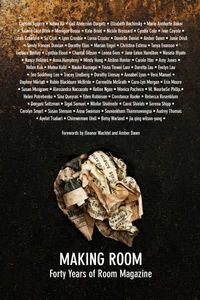Special Feature: Celebrating 40 Years of Feminist Publishing with Room Magazine
Room magazine (originally titled A Room of One's Own) is one of Canada's leading literary journals. During its 40 years in operation, it has been dedicated to publishing writers and artists who identify as women and furthering women's writing in Canada.
Room recently released the anthology Making Room to mark their 40th anniversary, filled with favourite pieces from the magazine's past, including writing from Lynn Crosbie, Lorna Crozier, Jen Sookfong Lee, and Marian Engel, as well as many other notable Canadian authors.
Today we are speaking with Room's Nav Nagra about Making Room and more. She tells us how the magazine's mandate has evolved over four decades, the new Growing Room festival, and how feminism and CanLit intersect.
Open Book:
Tell us a little about Making Room: Forty Years of Room Magazine. Why did you decide to put together an anthology to mark this anniversary, and how did it come together?
Nav Nagra:
Making Room was put together to mark Room’s 40th anniversary and to also give us a platform where we could showcase the amazing work that has been featured over the decades Room has been published. The anthology wasn’t an easy process by any stretch and it came together through our collective’s tireless work of finding past issues, sifting through over 150 issues to find the best work to represent the manifestation of the magazine over the years and then ultimately bringing 40 years of Canadian feminist writing down to a neat (400 plus page) anthology.
OB:
What was Room's original mandate 40 years ago? Has this changed in the intervening years?
NN:
Room’s (originally called Room of One’s Own) original mandate was to give a space for female Canadian writers, a space where the male voice wouldn’t drown out that of the woman’s. It was a representation of feminism as it was in the 1970s. I would say it’s not that our mandate has necessarily changed over the years but rather it has evolved. Whereby, Room is still a space for the female-identifying writer to be heard but our mandate has stretched to inclusivity of a multitude of voices all from various backgrounds, identities, and experiences.
OB:
What can you tell us about the new Growing Room festival? What is the festival's connection to the magazine, and why is it important for this festival to happen now?
NN:
Our Growing Room festival first began as a way to officially launch the anthology out into the world but quickly grew to become a weekend-long festival of workshops, panels and readings that enabled us to showcase the amazing talent we have not only within our magazine but also throughout the Can Lit community. I think it was important for the festival to happen now because as Room evolves so does the literary and cultural landscape. I believe that feminism is truly coming out from the shadows and through our festival and Room itself we are able to show the evolution and continued importance of feminist expression through writing and art in general.
OB:
What challenges are female-identifying writers in Canada currently facing? And how does the concept of community, in and around organizations like Room and Caitlin Press, factor into confronting these challenges?
Your CanLit News
Subscribe to Open Book’s newsletter to get local book events, literary content, writing tips, and more in your inbox
NN:
I believe that the challenges female-identifying writers are still facing many of the same we have always been facing. I believe we still have to fight to be heard fairly and seriously. I also think that female-identifying writers are still challenged with the prescribed notions of what it means to be a female-identifying writer. Often we are boxed into one category when truly we as writers fit into many categories all unique to our experiences and identities. Or perhaps we don’t fit into any category and are all our own and bringing that out can be just as challenging.
I think the concept of community found in organizations like Room and Caitlin Press allows us to realize that we are all fighting the same fight. It might be from different angles but essentially if we all work together, we might be able to fend off these challenges as a community. It’s one of the aspects that really stuck out to me during the festival, the sense of community was staggering. We were all there for essentially the same reason.
OB:
What comes next for Room and Caitlin Press?
NN:
I can’t speak for Caitlin Press but I’m sure truly astonishing things are in store. For Room, I think the next 40 years is what’s next. We have some amazing work that will be published in our upcoming issues and we have some ground to break now that we have completed our first Growing Room festival. It’s essentially what’s next. We’re just growing with the aim to continue to publish the works of great Canadian writers.
______________________________________________________
Room is Canada’s oldest feminist literary journal, and has published work by writers and artists who identify as women or genderqueer for forty years. Published quarterly by the West Coast Feminist Literary Magazine Society, also known as the Growing Room Collective, Room showcases fiction, poetry, reviews, art work, interviews and profiles about the female experience. We believe in publishing emerging writers alongside established authors, and because of this, approximately 90% of the work we publish comes from unsolicited submissions or contest entries.




